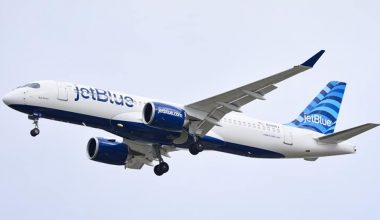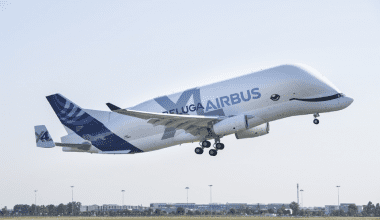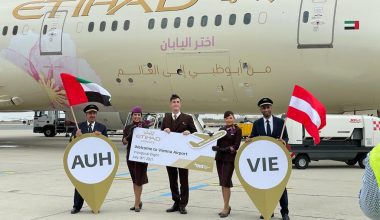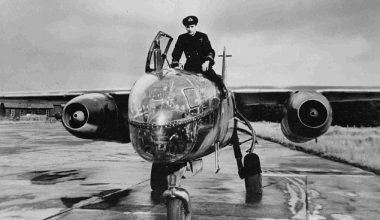The United Kingdom gets the new airline Flypop, the low-cost, long-haul operating carrier set to commence its flight between UK and secondary cities within South- East Asia. Flypop is a new UK-based international airline providing affordable, low-cost, and direct flights between the UK and second South Asia cities starting with India. The startup carrier has based its headquarter at London Stansted airport. It has the motive of making its presence in India and further plans to expand into North America. In such a scenario, it will serve passengers (tourists, VFRs) from the UK, India, and North America.
Read More: These are the 10 safest low-cost airlines in the world
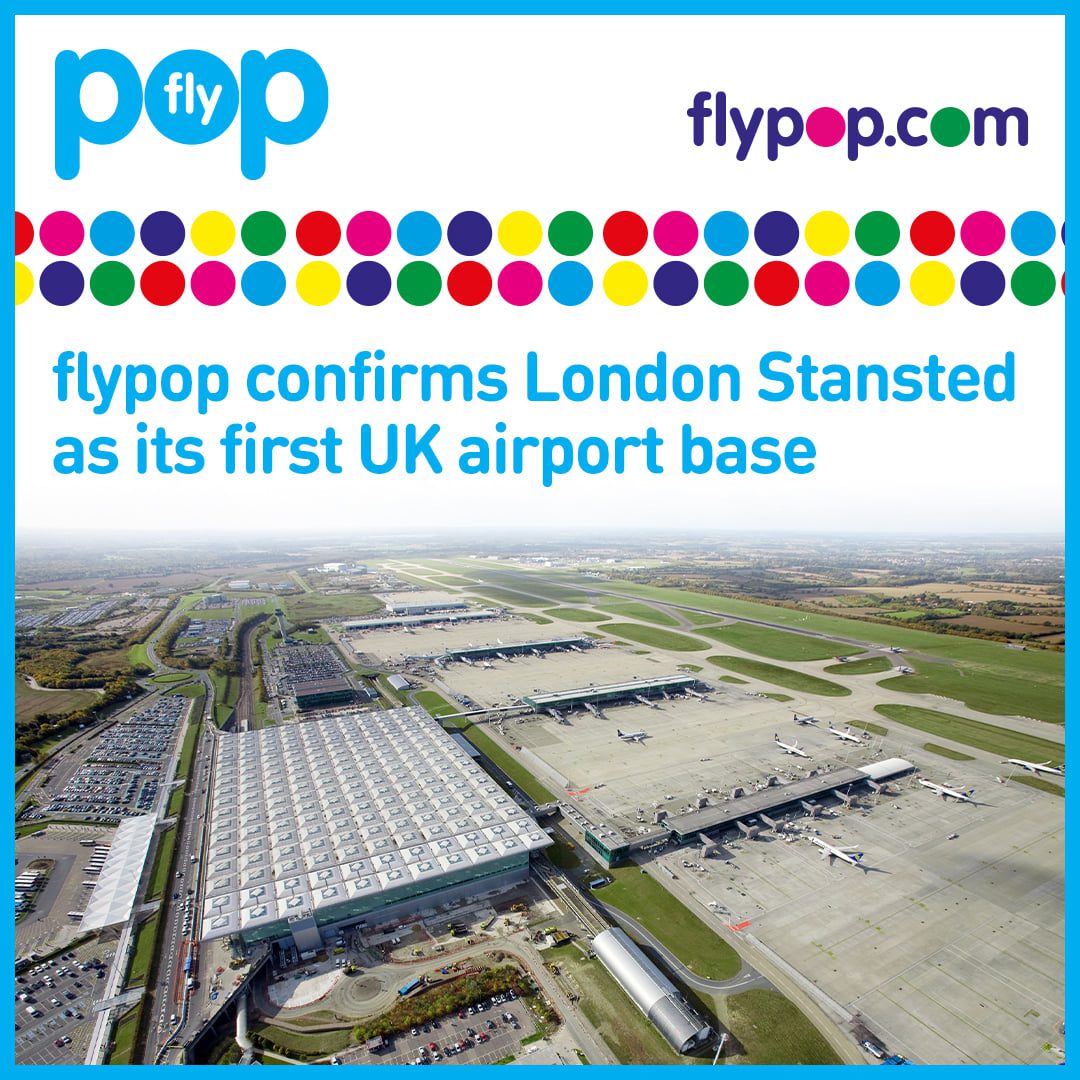
Destinations
Flypop has high hopes of starting its venture by offering low-fare flights between the UK and India. The airline affirms to be the pioneer of British budget airline operating its flight from the UK to South Asia commencing in India. The “pop” in “Flypop” is meant to be “People Over Profit,” signifying its low-cost operation. The new budget carrier Flypop has the ambition to fly between London and secondary cities in India with its newly leased aircraft, as it has signed an agreement for leasing multiple aircraft.

Flypop plans to make three weekly flights to Amritsar and Ahmedabad (the business capital of Gujarat). It is also pinpointing Goa and Kolkata as its new flight sector. The other cities of India that Flypop aspires to offer flights are Puna, and Cochin including other South Asia cities of Islamabad (Pakistan), Sialkot (Pakistan), Colombo (Sri Lanka), Kathmandu (Nepal), Lahore (Pakistan). With its ultra-low fares and short flying hours, and ease of getting an electronic visa in India, Flypop has the opportunity of attracting its customers.
UK-based Flypop is such an airline that has been seeking to operate for many years. Witnessing a great gap in the air travel market from the UK to India’s secondary cities, Flypop has been in its business plan since Mid-2019. The airline operators have signed agreements to acquire aircraft to initiate flights, so the airline is ready to start its flight operations now than ever before.
Flypop Aircraft
Flypop announced that it signed the aircraft lease agreement for Airbus A330-300s (though a number of aircraft leased isn’t disclosed), apparently signed with large aircraft leasing Irish company Avalon. The A330-300 aircraft, being the wide-body with its seating capacity of over 400 passengers, equipped with twin-engine and possessing double aisle, is expected to offer the lowest seat fares to passengers of Flypop to India. The airline is able to apply for Air Operator Certificate (AOC) to the Civil Aviation Authority of the UK after the aircraft lease deal, and the airline is prepared to operate its first flight in October. Flypop plans to configure these A330-300s in one service class. The airline is opting for a 3-3-3 configuration.

Without hassles of multiple connections across different airlines, with a flying list of wide-body a330s, Flypop promises precedent low fares, which will be the key selling point for a price-sensitive market. With travel still tricky between UK and India, it is set to launch for October 2021 but if the environment is not favorable, it has the luxury of waiting a little longer without suffering financial burden.
By offering point-to-point non-stop flights to the passengers to their promising sectors, it aims to combine British best management strategies with South East Asia’s warm, heartfelt hospitality. More excellent air connectivity on the proposed route network of Flypop is intended to generate much-required benefits for both the UK and India in terms of economy.
The flights are intended to be affordable to the general public, quicker, safer, and hospitable, where every passenger will be respected and treated kindly. They are committed to offering memorable journeys for their travel experience. As an intangible product, Flypop will always attempt to provide, superior level of customer service and a great flying experience, and high value for its customers. More than having just a customer, staff, and business mates, Flypop strives to create an extended airline family which includes all socially aware people. As unity strengthens every sector, so will the Flypop family through support which can positively impact its business. The Flypop approach includes not just good business but long-lasting, sustainable air business.

The concept of budget airline emerged in the 1970s by America-based domestic airline Southwest with the sole purpose of offering low air prices to passengers, challenging the already established flag carriers or full-service network carriers. The concept started after Airline Deregulation Act. The deregulation act of 1978 increased competition and fares discounts while opening many hub stations and expanding the route network. With the rise of low-cost, long-haul travel, Flypop has taken up this business model.
The budget carrier Flypop has its ethos of not only making the flights affordable for large unmet market of India; it equally strives to offset carbon emission in the geographical areas it flies by helping such oriented projects. It seeks to do the right acts for protecting the natural environment of Earth. Flypop is convinced to grow sustainably. As airlines contribute significantly to environmental pollution, it plans to be the first genuinely carbon-neutral airline to operate internationally in aviation history by offsetting carbon emissions.
The Story behind Flypop
As there were no low-cost and short-duration flights involved to facilitate his visit to his family in Ludhiana, India, back in 2003, the CEO of Flypop Nino Singh Judge, Nino, was frustrated and got the idea to connect India with direct low fare flights. As the air service agreement couldn’t be held between UK and India, it was impossible to commence flights or receive flight slots at Heathrow airport.
After the decades of the fast-changing external environment, i.e., the shift social, economic, political, technological scenarios, the project to fly between two countries revived. The new formal treaty to allow international air transport service between the UK and India permitted a certain number of weekly flights to secondary cities of India. As a fast-growing economic country, India made a heavy investment for the up-gradation of the Amritsar and Ahmedabad airports to international standards. The Flypop team is currently working with more than Airports to offer an affordable and convenient option to the preferred destinations cities of its customers.
Flypop features
Flypop offers one class service of the economic layout. The total seats will be 436, which can be reduced to 418 seats by adding an extra legroom option. With the total lease aircraft of 3, it will offer a typical Low-Cost Carrier basic fare, which includes a seat and one small bag. Meals, baggage, and extras, which are the optional amenities, will not be included in the airfare and will cost extra for passengers. The passengers can bring a 25 kg check-in baggage weight allowance on the principle of pay per item baggage option. The airline also offers a menu of other optional ancillary services like in-flight entertainment, Indian as well as British meals and beverages. The savings that are made from service suppliers will be passed on to the passengers to construct an industry-beating fare.
The fares of Flypop are yet to be published, but they may start as low as GBP 150 for tickets for a one-way journey. The target market of Flypop is mostly Visiting Friends and relatives (VFR). These are the passengers of UK nationals of Indian diasporas, who will be able to visit relatives back home while flying on routes that are not currently served by other airlines, eliminating the need for an interruption in passenger journey while they remain the controller of what they pay for. With cheap air prices and non-stop service, short day visits to friends and families will be possible.
Opportunities and Challenges
Although the agitation of the COVID pandemic hasn’t been over, the startup of airlines hasn’t failed to grow up in 2021. Aviation, involving the movement of passengers, and goods by air, has been the most affected sector of all. Flypop is one such example that has pursued aviation crisis just as a blip. As the regularly scheduled flights offered by airlines have been devastated by the pandemic, but for Flypop, it has been the right time to start an airline. Several new carriers are now popping up despite several cuts in staff numbers, operated routes, and aircraft by running carriers. Several investors and even some airlines have invested and injected capital into this new carrier to accomplish its objectives.
Flypop has raised 7million in funding from private investors. It has increased its further funding from the UK government’s Future Fund, as the government is seeking to support the innovators affected by the COVID pandemic. Flypop has yet to face its biggest test. There will be a need to separate expenditure amounts on airline employees, aircraft maintenance, and marketing for ticket sales before flight operation. It’s not a big deal to take up a low-cost business model, yet the challenge still remains to grab a market in such a competitive area. Flypop teams are planning a cautious strategy to make the low-cost model pay off.



